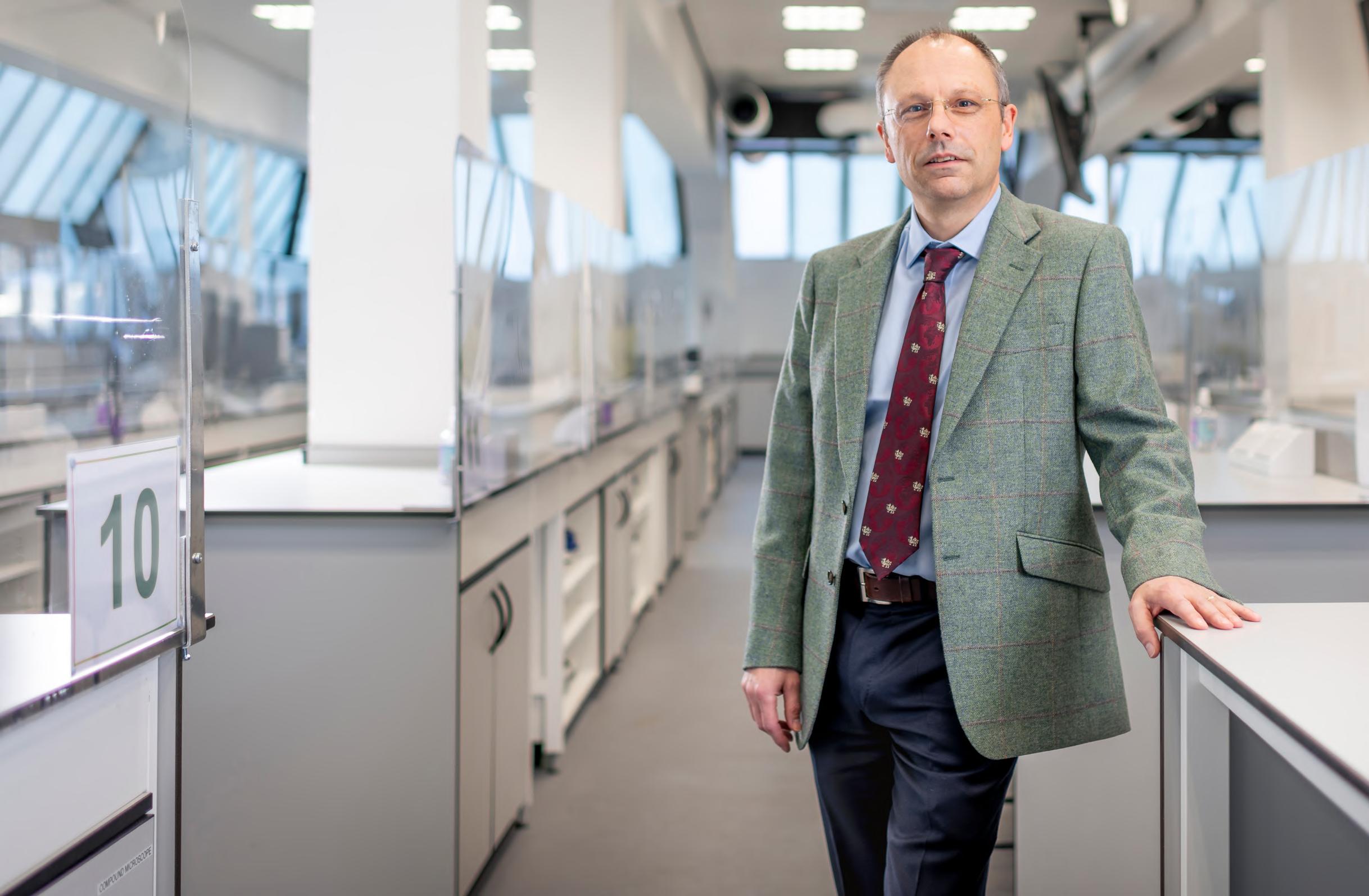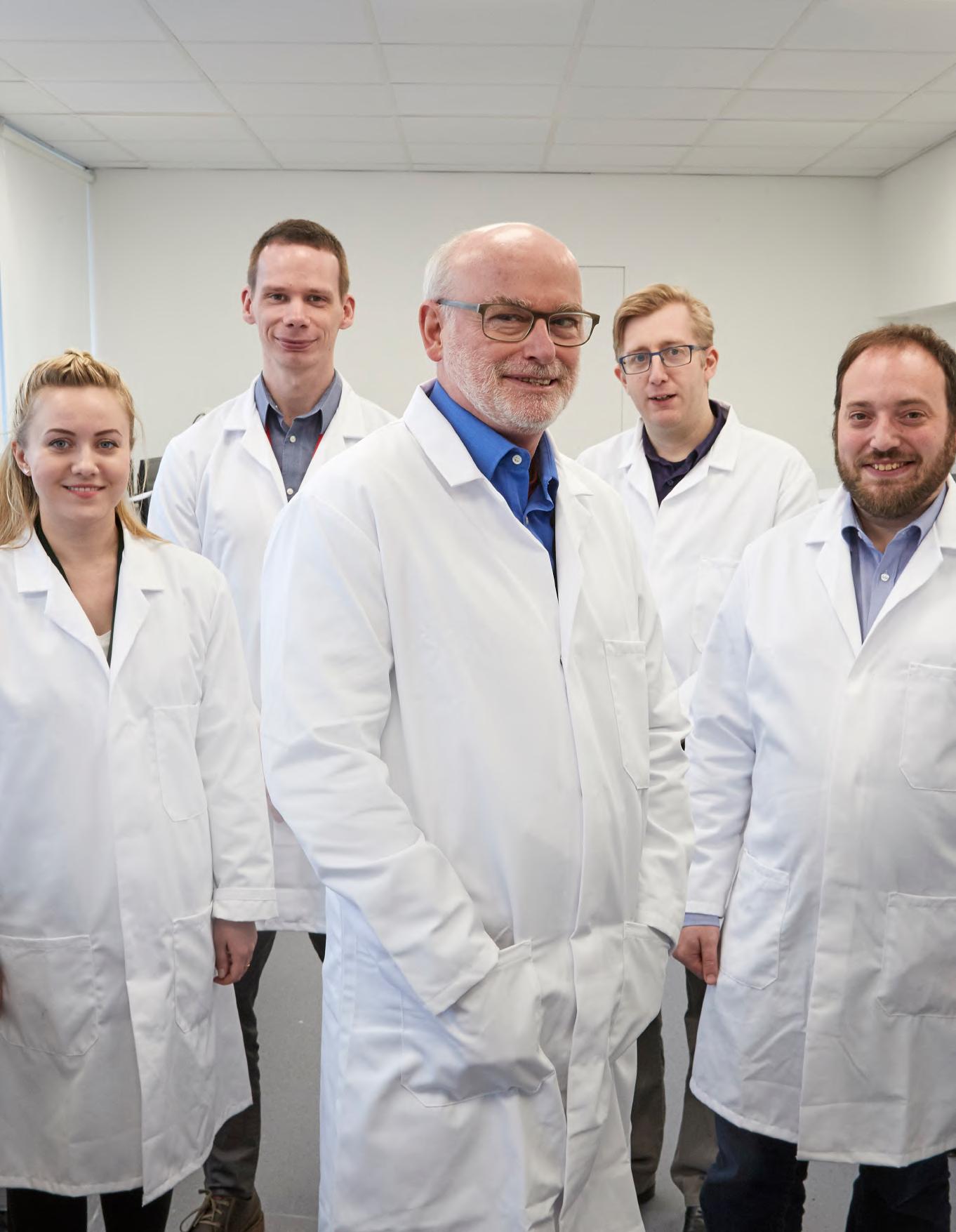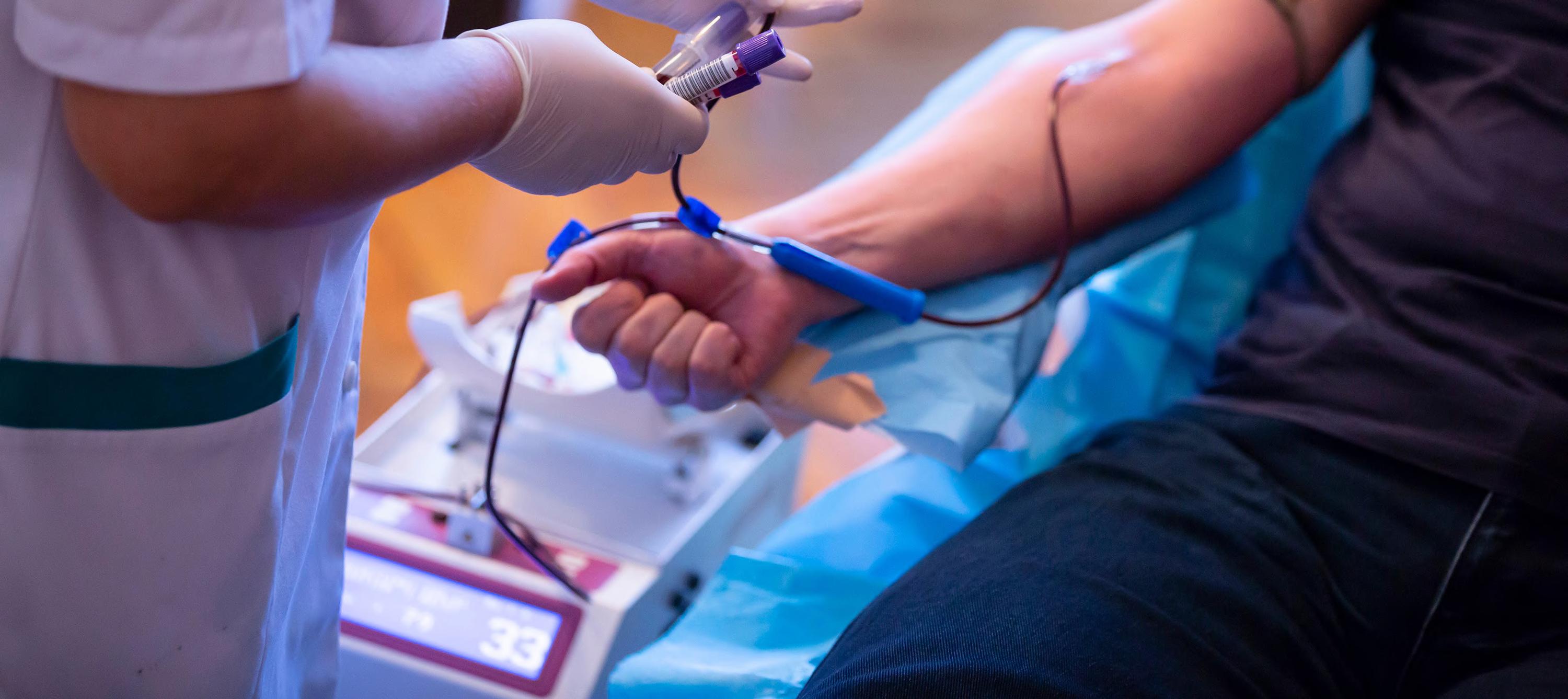
10 minute read
Strategy 2030 - a sustainable world for future generations
from Annual Review
Pro-Vice-Chancellor for Research and Impact, Professor Paul Spencer, said: “Making our University synonymous with sustainability means there should be sustainability elements in all our research and, together with the impact of our research endeavours, this will provide a living definition that evolves and remains relevant. By bringing together our research and impact excellence in this way, we can be at the forefront of emerging societal priorities and challenges as well as contributing to future Government policies and practices to address them. “Alongside this we will establish ‘quantum leap’ projects giving the University the potential to increase research scale. Our Governmentbacked plans for a North Wales Medical School is a great example of what can be achieved by closely collaborating with stakeholders around a transformative ‘quantum leap’ project that seeks not only to deliver an innovative inter-professional School, but also one that builds on our research strengths in Human Sciences and seeks to help develop future health and social care that is sustainable, place-based and supports the growth of the regional life science sector.”
COVID – 19 RESEARCH
The COVID-19 pandemic represents one of the greatest recent threats to human health, wellbeing and economic growth. Bangor University secured more than £16 million in funding towards COVID-19 related research which included establishing the first UK national-scale wastewater-based epidemiology network for the monitoring of SARSCoV-2 in the general population of Wales. As the world began to realise the scale of the emerging pandemic, a team of researchers at Bangor University, led by Professor of Soil and Environmental Science, Davey Jones, recognised the important need to act with their expertise and capabilities. With funding from Welsh Government, our researchers monitored the changing state of the pandemic in Wales, supported and informed public health policy decisions, and built national capacity for future pandemic preparedness. It has highlighted the important role the wastewater industry plays in national public health. Scientific excellence: Wales has pioneered the use of wastewater for national level COVID-19 surveillance. This was adopted by England and rolled out by the Joint Biosecurity Centre at 44 sites, scaling to 250 by 2021. Disease incidence: The University was responsible for setting up a national-level wastewater monitoring programme for COVID-19 which covered 20 key sites and captured close to 70% of the Welsh population. This is now part of the Armakuni dashboard which reports on national disease incidence to support public health agencies in Wales. In addition, the work has supported targeted mass testing both in England and Wales. Research excellence and impact: Wastewater research is highly novel and has produced eight journal papers underpinning the national science programme. The University has contributed expertise to international collaborative efforts to develop wastewater-based epidemiology best practice across Europe and further afield. The funding also provided opportunities to build on research strengths in Wales in environmental sciences, disease surveillance and pathogen genomics.
ANNUAL REVIEW 2020 - 2021 ANNUAL REPORT 2020 - 2021
RESEARCH CASE STUDIES

53.2293° N, -4.1309° W
ADVANCING NUCLEAR TECHNOLOGIES
The University’s Nuclear Futures Institute (NFI) has been advancing nuclear technologies in North Wales since its inception in 2017. Nuclear energy plays a key role in the region with two nuclear licensed sites – Wylfa and Trawsfynydd – and a rapidly growing industrial and academic resource at the University and our science park, M-SParc. The NFI’s stateof-the-art facilities are also being used by leading industry stakeholders to aid nuclear technology development.
The Institute has a track record in building networks and is heavily involved in several Engineering and Physical Sciences Research Council (EPSRC) sponsored consortia including as part of a Centre for Doctoral Training led by Imperial College and collaborations between UK academia and Indian researchers as lead of a UKIndia Civil Nuclear Programme. Funded by Welsh Government, the NFI is developing a Thermal Hydraulics Open access Research (THOR) facility at M-SParc and as part of the National Nuclear User Facility infrastructure, it has been granted funds to build the Bangor University Fuel Fabrication Facility that will act as a focal point for research in the UK and internationally. Investment from the Welsh Government’s Sêr Cymru programme and the European Regional Development Fund in 2020-21 funded 15 new science posts and enabled the University to expand its work in the nuclear field into medicine, control and instrumentation, structural materials and fusion energy. Professor Bill Lee, one of the world’s top material scientists, is director of the NFI. He said, “This is a great opportunity for North Wales, providing excellent research and training infrastructure along with a much more significant nuclear programme.
Meanwhile, Fusion power has taken one step closer to being a commercialisable source of abundant, clean and reliable energy. For years scientists and engineers around the world have been working towards getting more energy out than they put into a fusion reaction on earth as the sun does, and this feat has now been achieved.
Researchers at the University are supporting this international effort by developing new materials and components to maintain the fusion reaction, turning from a ‘flash-in-a-pan’ to a sustained reaction.
The researchers in North Wales were funded by Tokamak Energy, the UK’s leading commercial nuclear fusion company, to accelerate their path to success. Additionally, the team in Bangor was awarded a Science and Technology Facilities Council (STFC) grant to use this fusion technology to produce medical isotopes to treat and diagnose illnesses such as liver and prostate cancer.

MICROBIAL ENZYMES FOR SUSTAINABLE DETERGENTS, TEXTILES AND COSMETICS
Work by scientists at the University’s Centre for Environmental Biotechnology and their project partners will result in the manufacturing of more environmentally friendly consumer products, from detergent to textiles and cosmetics.
The University team is part of FuturEnzyme, a multidisciplinary consortium of 16 European academic and industrial partners. Lead by Professor of Biology, Peter Golyshin, the Bangor University team received EUR 550k funding to focus on high-throughput, small-scale production and characterisation of enzyme candidates important in industrial manufacturing of textiles, personal care products and detergents.
CHANGING UK BLOOD DONATION POLICIES
Researchers at the School of Health Studies contributed towards the decision to change the UK blood donor selection policy from being one based on sexuality to one based on individual sexual behaviour.
The team took part in the FAIR (For the Assessment of Individualised Risk) project, which collated the evidence required to change the UK blood donor selection policy. FAIR carried out a review to assess and understand the highest risk sexual behaviours for acquiring blood-borne sexually transmitted infections (STIs). The Bangor team conducted a survey with the entire staff and student body providing important information to underpin the development of a blood donation assessment questionnaire concerning sexual behaviour in relation to blood donation. The FAIR steering group concluded that donors who have had the same sexual partner in the last three months and who don’t have an STI should be eligible to donate. The result of the review met with ministerial approval which meant that a man in a long-term relationship with another man has been able to donate blood from Summer 2021.
PIONEERING PROJECT TO SAFEGUARD OUR ICONIC OAKS LAUNCHED
Experts at the School of Natural Sciences contributed to a pioneering project to investigate the role of beneficial microbes in fighting diseases that affect our native oak trees. The research was supported by £1.3million of funding from the Bacterial Plant Diseases programme funded by the Biotechnology and Biological Sciences Research Council (BBSRC), Natural Environment Research Council (NERC), Defra and Scottish Government and is also supported by Action Oak.
The FUTURE OAK project studies how oak microbiomes are affected by environmental change and disease. Acute Oak Decline (or AOD) is one disease which poses a significant threat to our native oak trees
The FUTURE OAK project is analysing hundreds of native oaks across Britain to understand which microbes promote health and fight diseases. Testing these microbes’ ability to suppress disease-causing bacteria will be a step towards developing biocontrol treatments to promote healthier trees and suppress the symptoms of AOD.
BILINGUALISM AND CHILDREN WITH DOWN’S SYNDROME
In the first study of its kind in the UK, researchers at the Department of Linguistics examined Welsh-English bilingual children with Down’s syndrome and found no evidence of additional difficulties compared to monolinguals.
Researchers compared a group of bilingual children with Down’s syndrome to a group of English monolinguals, and found comparable performance in English, as well as considerable skills in Welsh.
Published in the Journal of Communication Disorders, the first group study in the UK and one of very few studies internationally, dispels the myth that exposure to two languages may cause problems for children with Down’s syndrome. These positive results will provide guidance for families and health professionals on bringing up children with Down’s syndrome bilingually. The Down’s Syndrome Association was partner and collaborator in the study which was co-funded by the ESRC/Wales Doctoral Training Partnership and the School of Languages, Literatures and Linguistics. The collaboration is continuing with a new project exploring bilingual development in autistic children with and without Down’s syndrome.

HOW DOES THE MEDIA INFLUENCE MASK-WEARING CHOICES?
In work funded by UK Research and Innovation a multi-disciplinary team of experts drawn from the fields of Media, Linguistics, Law and Bio-composites explored the influence of media messaging on people’s mask-wearing choices in the pandemic.
The research examined not just mask wearing, but the choice between disposable versus reusable facemasks and their impact on the environment. The aim was to examine current facemaskwearing behaviour as influenced by the media to inform future media campaigns by governments and other institutions in the future, specifically considering environmental issues.
If masks should continue to be worn, this new research will identify how more people can be encouraged to wear them and use them in an environmentally sustainable way.
RESEARCH INFORMS INTERNATIONAL CONSERVATION GUIDELINES
Rewilding is a nature-led approach to conservation giving more space to nature, repairing damaged habitats and restoring lost wildlife while minimising human influence to promote natural processes.
It is championed as a proactive way to address the global environmental crises, not just protecting existing wildlife but giving nature more freedom and room to flourish – learning from nature rather than trying to micro-manage it. Dr Sophie Wynne Jones’ research considered the social dimensions of rewilding, a key aspect developed for the Guiding Principles for Rewilding in Conservation Biology. It is important to consider the concerns of those who will be affected by proposed changes and implement conservation measures in a way that minimises negative impacts on resident communities to gain their support and engagement. The principles outline the need for local engagement and support, so that rewilding can be inclusive of all stakeholders and local knowledge can be included as a key part of the process.
PIONEERING WORK IN DATA VISUALISATION EXPERIENCES
Researchers from the School of Computer Science and Electronic Engineering presented their pioneering work on Immersive Analytics at the Institute of Electrical and Electronic Engineers VIS 2020 conference, the premier forum for advances in visualisation and visual analytics.
VRIA is a web-based framework that allows the creation of data visualisation experiences in Virtual and Augmented Realities (VR/AR), collectively called XR. It offers an alternative ecosystem to similar, game-engine tools, offered by the Universities of Monash, Michigan and Harvard. Bangor University’s focus on the Web, as the most ubiquitous sharing platform, allows VRIA to be pervasive, and accessible through a browser. This enables rapid collaborations and evaluations, particularly useful in the current climate where people around the world are working online because of the pandemic and in situ experimentation is restricted.
In addition, future communication systems, such as 5G, researched by the University’s Digital Signal Processing Centre will make such applications much more pervasive and immersive. Bangor is one of the few universities that works on this cutting-edge theme, among organisations such as W3C, Google, Microsoft and Mozilla. VRIA has been downloaded more than 3,000 times since it was presented in 2020.
CROP ROTATION WITH LEGUMES OFFER MORE SUSTAINABLE FOOD PRODUCTION
A study from the School of Natural Sciences provided evidence that growing more legumes, such as beans and lentils, is potentially a more sustainable and nutritious approach to European agriculture.
The study presented some of the first holistic evidence that adding legumes to traditional crop rotations (typically including barley, wheat and rapeseed) offers significant environmental benefits as well as increased nutritional value for humans and livestock.
This strategy will contribute significantly towards the specific European Union Green Deal Farm to Fork objectives to reduce greenhouse gas emissions, use of chemical pesticides, and synthetic fertiliser use.
The results also highlighted the need for whole-system - multicrop, farm-to-fork - thinking when designing interventions to drive sustainable food systems so that better nutrition is provided whilst reducing environmental impacts.





